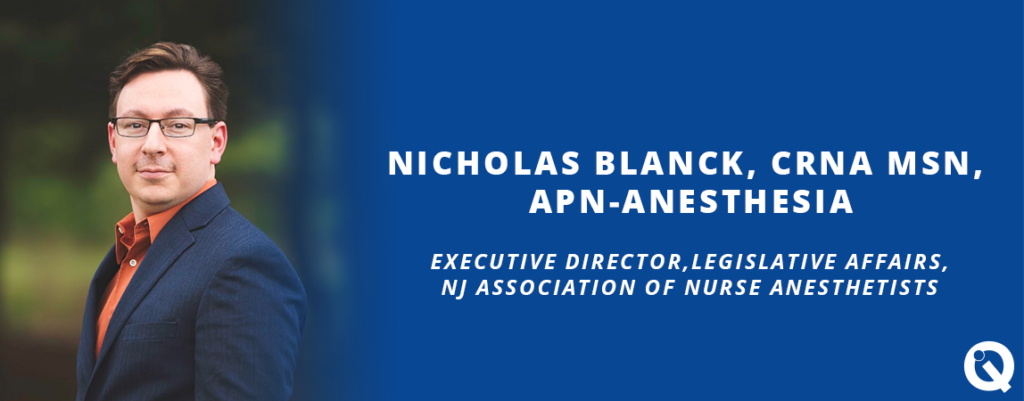Nicholas Blanck, CRNA MSN, APN-Anesthesia, is the Executive Director of Legislative Affairs for the New Jersey Association of Nurse Anesthetists (NJANA), a member of the Quality Institute’s Association Council.
Managing the pain and comfort of patients going into surgery can be challenging, especially during this pandemic. How does a nurse anesthetist ease this stress?
It starts with our extensive training. Many people don’t know that advanced practice nurses specializing in anesthesia aren’t just better trained nurses. We achieve master’s degrees — and now are required to achieve doctoral level education. We have years of clinical training before we can even be considered for a nurse anesthesiology program. Part of that extensive training includes understanding the psychological impact that pain, and disability, and surgery have on a patient’s mental health. It’s an accountability for every aspect of the surgical experience because of our extensive training to understand the patient’s medical history and health history. Our nursing background in therapeutic communication and the ability to administer compassion to these patients allows us to reassure patients, and to communicate with their families, throughout the process.
What are some of the more rigorous requirements nurse anesthetists must meet in New Jersey?
Advanced practice nurses who specialize in anesthesia are required to be trained at the doctoral level now to enter into practice. They must be nationally board certified before they can ever administer anesthesia to a single patient. In addition, we have to carry malpractice insurance at the same level of physician anesthesiologists. Those malpractice insurance premiums are consistently decreasing, year after year, which is due in part to our safety record and our track record as practitioners.
How did the COVID-19 Pandemic change things for Nurse Anesthetists in New Jersey?
When we talk about regulations in nurse anesthesia practice post pandemic, we have to talk about Governor Murphy’s Executive Order Number 112. He took decisive action to remove this joint protocol, which is a more than 12-year-old concept that an advanced practice nurse in anesthesia must work in the presence of a physician anesthesiologist. Murphy removed that regulation and optimized the nurse anesthesia workforce to be able to move into the most needed areas of health care based on our skill set and our education. So we coordinated patient care in ICUs and were able to take ownership over the entirety of the anesthesia experience in some ambulatory surgery centers, dental offices, and physicians’ office. The change to the joint protocol rule, unfortunately, will expire when the public health emergency expires. Other states, such as Massachusetts and Delaware and about 20 other states, they have made removal of that regulation permanent. We believe this change should be made permanent here as well, as we have a proven track record of safe, high quality, and affordable care.
How does being a member of the Quality Institute help advance the mission of your organization?
The Quality Institute, we believe, is the standard bearer for quality health care and safety in the state. So as members, it gives us the opportunity to present the best of what we are as advanced practice nurses in anesthesia, as CRNAs, and offer that to the larger health care audience that the Quality Institute maintains here in New Jersey. I believe that the Institute has supported us because we follow the rules and the protocols that are set forth strictly — to provide high quality care while keeping patients healthy and safe. I think the Quality Institute helps to further the potential of the advanced practice nurse in anesthesia and the important role that we play in a variety of health care settings.
We like to ask people about something beyond their professional lives? Where might we find you on a day when you are away from work?
The majority of my life revolves around patient advocacy and everything that goes into being a nurse. You find out when you become a nurse that what you thought was a career becomes a vocation. I still provide anesthesia as a CRNA in New Jersey and the surrounding states. I am the president and CEO of UltraCare Anesthesia partners, which is a growing full service anesthesia health care business based here out of New Jersey. I’m an adjunct professor of nurse anesthesiology at Rutgers University at Newark. My wife is an emergency room nurse. My daughter is in nursing school eying up a career in nurse anesthesia. In my free time, I’ve volunteered as an EMT and a firefighter. I love being outdoors. I rock climb with my family all over the country as often as I can get out there.

